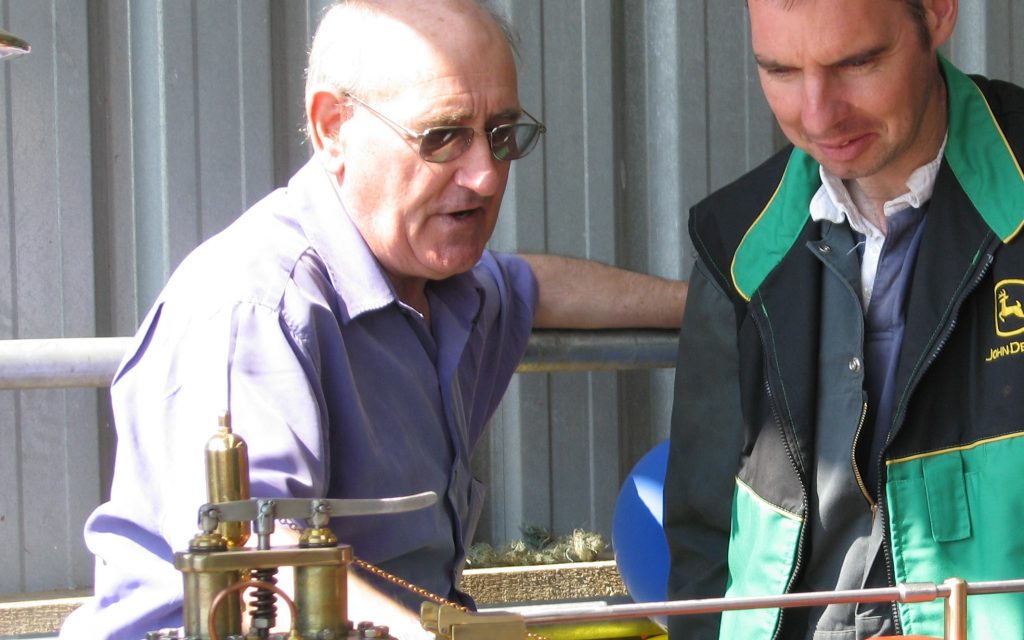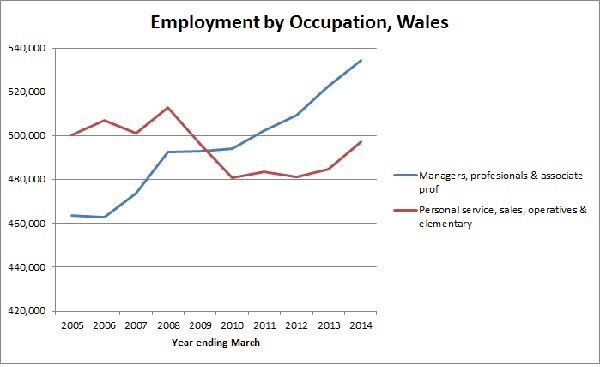 Economy
Economy 
One of the biggest changes in the Welsh economy and society has taken place over recent years – and we’ve scarcely noticed.
While we’ve been worrying about the demographic time-bomb of an ageing society, the problems of poverty and social exclusion and the impact of climate change, the Welsh workforce has been quietly transformed – from one where the blue-collar worker was in the majority to one where managers and professionals outnumber their less skilled counterparts.
The graph below is one of the most striking I have seen in some time (and with apologies for the quality). It shows the number of people in employment in Wales for each year from 2005 to 2014. The blue line is people in managerial, professional and associate professional jobs. The red line is people in caring, personal service, retail, operative and ‘elementary’ jobs like cleaning. (Admin jobs and skilled trades jobs are not included). Look carefully and read on.

Source: Annual Population Survey
So what does this tell us?
First of all, it is clear that the very worst the recession did to managers and professionals was stall their onward march for a couple of years. Come 2010, and the upward resumed and has continued ever since, so there are now more than 530,000 in these kinds of jobs with few signs of the trend halting. People in semi- and unskilled jobs on the other hand were hit hard by the economic downturn, losing more than 1 in 20 of their jobs in just two years. What little recovery there has been has only occurred in the last year – and the total number of semi- and unskilled jobs is still less than in 2005.
Whether the recession made any difference to you and whether you think there has been a recovery very much depends on what your job is.
Second, the graph matters for everyone trying to ‘help people into work’ whether it is school and college leavers or Work Programme providers and the like. All those looking for so-called entry level work, where few or no qualifications are required, are clearly trying to enter a shrinking pool. The conventional wisdom is that there are jobs out there and people just need help / a shove to get one. But maybe that ‘work first’ idea is past its sell-by date – perhaps what’s needed is more training to get people further up the career ladder.
Third, the graph suggests that the likes, dislikes, aspirations and ambitions of Welsh people have probably changed dramatically. If it is the case that professional and managerial groups have different preferences to semi- and unskilled ones, whether it is what newspaper they buy or what kind of home they aspire to, then Wales is definitely more broadsheet than tabloid, more owner-occupier than council house, than it was in the past. It’s unimaginable that big businesses like Coca Cola or Next do not understand their market and how it is changing – so too should public service providers.
This is a caricature of course but all the same those who provide services (public or private) need to take note – as should political parties.
The difference between managerial and professional jobs, and semi- and unskilled ones, is not just about trends in numbers. The terms and conditions are very different too. Semi- and unskilled jobs are twice as likely to be part time as managerial and professional jobs, and their gross weekly pay is, on average, very much lower too. A typical professional earns a gross weekly wage of £609.40 while a typical worker in a care, leisure or service job earns less than half that at £248.90 a week. What you do at work looks still to be one of the great divides in society.
Victoria Winckler is Director of the Bevan Foundation. Sign up for our free e-newsletter to find out more about what we do and to keep up to date.


